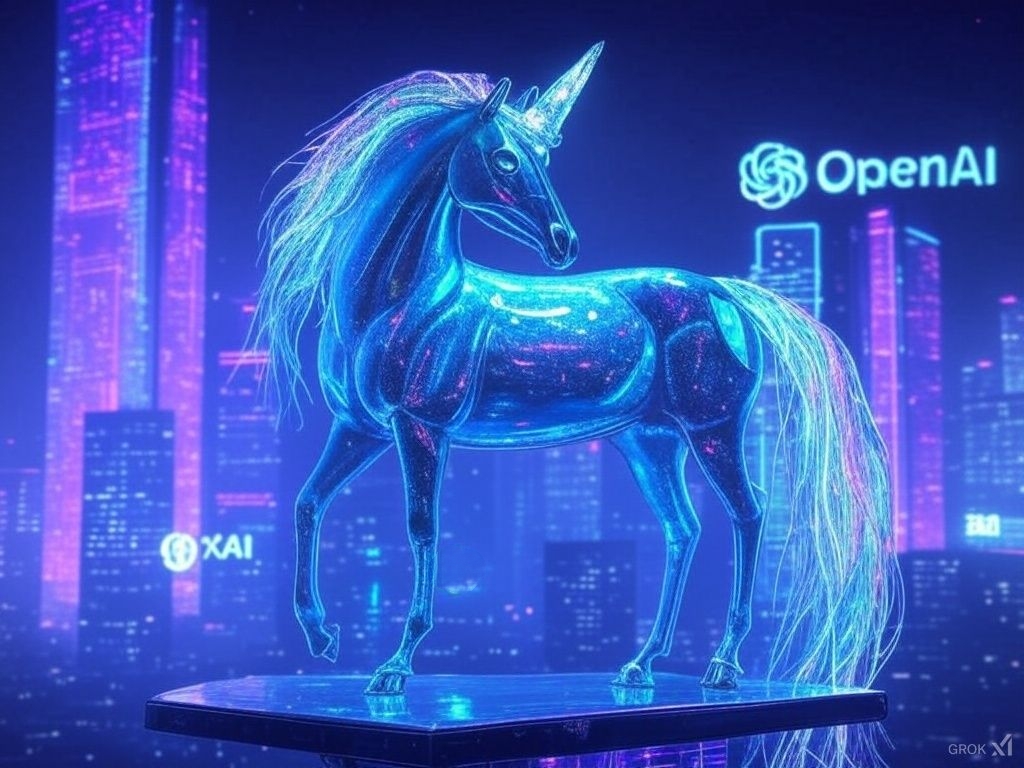Top 10 Global AI Unicorns Shaping Technological Innovation in 2025
The global AI landscape in 2025 is dominated by a cohort of pioneering startups that have redefined industry standards, attracted unprecedented valuations, and catalyzed transformative advancements across sectors. Leading this charge are AI unicorns—privately held companies valued at over $1 billion—whose innovations span natural language processing, quantum computing, cybersecurity, and humanoid robotics. OpenAI retains its position as the most valuable AI unicorn at $157 billion, driven by the widespread adoption of its generative AI models, while newcomers like xAI and Safe Superintelligence underscore the sector’s focus on ethical AI development. This report analyzes the top 10 AI unicorns of 2025, their technological breakthroughs, and their role in steering global AI trends amid a rapidly evolving ecosystem.
 |
| Image created by Grok |
The Evolution of AI Unicorn Valuations
The AI startup ecosystem has experienced exponential growth since the early 2020s, with valuations reflecting both technological potential and market confidence. By 2025, the cumulative valuation of AI unicorns surpasses $5.2 trillion globally, fueled by advancements in generative AI, robotics, and quantum computing. The term "unicorn," coined in 2013 to denote rare $1 billion startups, has evolved to include "hectocorns" like SpaceX ($350 billion) and OpenAI ($157 billion), which dominate the upper echelons of private market valuations.
A key driver of this growth is the surge in venture capital investment, particularly in AI-driven enterprises. In 2024 alone, 46% of new unicorns were AI-focused, highlighting the sector’s centrality to technological progress. Companies like xAI and Perplexity AI exemplify this trend, achieving billion-dollar valuations within two years of inception by addressing gaps in AI safety and enterprise applications. However, concerns about overvaluation persist, with predictions suggesting a contraction to fewer than 700 unicorns by 2025 as markets recalibrate.
Top 10 Global AI Unicorns in 2025
1. OpenAI
2. xAI
3. Perplexity AI
4. SandboxAQ
5. Safe Superintelligence
6. Sierra
7. Moonshot AI
8. Cyera
9. Poolside
10. Physical Intelligence
Emerging Trends in AI Development
Ethical AI and Regulatory Compliance
The rise of xAI and Safe Superintelligence reflects a broader industry shift toward ethical AI development. Over 60% of 2025’s AI unicorns now publish transparency reports, detailing data sourcing and bias mitigation strategies—a practice mandated by the EU’s AI Act.
Quantum-AI Convergence
Companies like SandboxAQ are leveraging quantum computing to solve intractable problems in cryptography and material science. This synergy has accelerated drug discovery timelines by 30%, with quantum-AI hybrids expected to dominate high-performance computing by 20276.
Autonomous Enterprise Agents
Sierra and Poolside exemplify the demand for AI that autonomously executes business processes. Gartner predicts that by 2026, 45% of repetitive corporate tasks will be handled by such agents, saving enterprises $3 trillion annually.
Geographical Distribution of AI Unicorns
The U.S. remains the epicenter of AI innovation, hosting 64% of global unicorns, including OpenAI, xAI, and Cyera. San Francisco alone accounts for 188 unicorns, driven by its dense talent pool and venture capital networks.
China’s AI sector, led by Moonshot AI, is the second-largest, contributing 14% of unicorns. Government subsidies and access to vast datasets have enabled Chinese firms to dominate AI applications in surveillance and smart cities.
India’s startup ecosystem, though younger, now boasts 250 unicorns, with Netradyne’s $1.34 billion valuation in 2025 highlighting its strengths in logistics AI.
Challenges and Future Outlook
Valuation Sustainability
Despite record investments, 35% of AI unicorns face profitability challenges, relying on speculative funding rounds. TRAC’s AI model predicts a 20% correction in valuations by 2026 as markets prioritize sustainable revenue.
Global AI Governance
Divergent regulations—from the EU’s strict compliance requirements to China’s state-centric policies—complicate cross-border AI deployment. Unicorns like Perplexity AI are advocating for standardized global frameworks to streamline operations.
Final Thought
The top 10 AI unicorns of 2025 exemplify the sector’s dynamism, blending cutting-edge research with pragmatic applications. As ethical considerations and quantum integration reshape the landscape, these companies will play pivotal roles in addressing global challenges like disinformation, cybercrime, and climate change.
References:
https://blocksandfiles.com/2025/01/16/ai-data-companies-dominate-new-unicorn-list-from-bestbrokers/https://www.forbes.com/councils/forbesfinancecouncil/2025/02/03/silicon-valley-unicorns-catalysts-of-innovation-in-q4-2024/
https://economictimes.com/tech/startups/robotics-startup-figure-ai-in-talks-for-new-funding-at-39-5-billion-valuation/articleshow/118267441.cms
